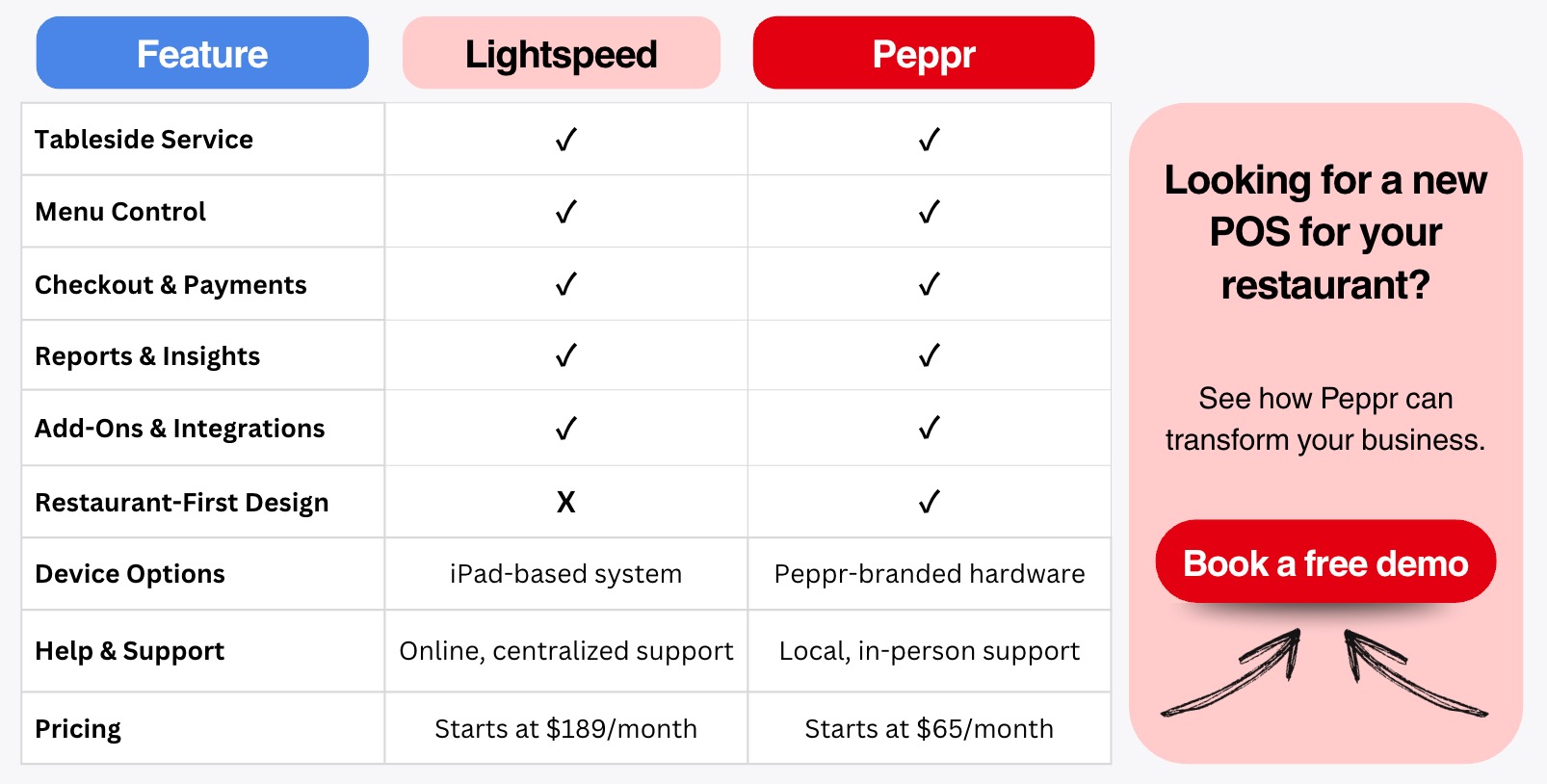Peppr vs Lightspeed POS: Compare restaurant-focused features, pricing & support options

Peppr beats Lightspeed POS in terms of local support, restaurant-first design, and pricing that doesn't nickel-and-dime you.
See how Peppr and Lightspeed compare.

The primary difference between Peppr and Lightspeed POS is that Peppr is specifically designed for restaurants, whereas Lightspeed focuses more on retail.
Lightspeed offers cloud-based POS solutions for retail and restaurants, but it often tries to be everything to everyone. That can leave restaurant owners feeling overlooked.
Peppr, on the other hand, is restaurant-friendly, sales-oriented, and designed by people who’ve worked in kitchens. It’s more customizable, mobile-compatible, and better at streamlining restaurant operations without the bloated cost.
Peppr accepts multiple payment types, including credit cards and digital wallets, supports fast tableside payments, and works with leading processors like Adyen and Worldpay, with no forced lock-in. This gives you freedom and speed at checkout.
Peppr’s built-in Guestbook makes it easy to track customer data and purchase history. But we’re not stopping there. Loyalty programs, promotions, and built-in email marketing are all on the way, with launches planned for the third quarter of 2025.
With Peppr, you can easily customize menus with modifiers and special requests, manage availability in real-time, and adjust pricing without having to dig through complicated settings. No need for a tech degree to make changes.
See all features of the Peppr POS here.
Lightspeed might send you links and guides, but Peppr shows up in person. While Lightspeed's onboarding can feel remote and generic, Peppr offers on-site installation, hands-on training, and local setup support.
Your team can take their first order faster with Peppr. They also offer mobile POS options for on-the-go sales, which makes it even faster to take orders. That means more time serving guests and less time trying to figure out how to use your system.
Peppr walks into your restaurant and helps get everything running. You get white-glove onboarding, full menu setup, and local experts who answer fast.
Lightspeed provides analytics and reporting tools for business insights, plus an online help center and 24/7 support. But that support often comes from a call center, not someone who understands your kitchen.
Peppr’s approach is personal. They monitor employee performance and sales metrics, provide on-site technical support and training, and treat your restaurant like it matters.
Read here for more Lightspeed POS alternatives.
Peppr allows you to improve operational efficiency and customer experience by boosting efficiency, elevating service, and keeping more of what you earn, all without the red tape.

A: The main difference between Peppr and Lightspeed POS boils down to restaurant focus. Peppr gives you tableside/handheld ordering, offline mode, and easy menu editing. Lightspeed offers great inventory management and analytics-driven tools, but is often too retail-heavy for restaurants.
A: Many restaurants outgrow Lightspeed because of rising fees, retail-focused workflows, and remote-only support. Peppr is more integration-ready, restaurant-focused, and simpler to use.
A: Start by auditing your costs and usage. Are you paying for feature-rich options you don’t need? Peppr can sync across multiple devices and locations, replace outdated workflows, and migrate your data with local help.
A: Peppr POS starts at $65/month, including hardware and software. Online ordering is included in the $200/month Pro plan. Compare Peppr plans here.
Lightspeed plans, on the other hand, often require add-ons for full restaurant functionality.
A: Peppr is built by restaurant people, for restaurant people. It’s scalable, cloud-enabled, POS-based, and reporting-friendly. Plus, it’s hands-down one of the most supportive restaurant POS platforms in the Dallas-Fort Worth area and in the greater Los Angeles/Orange County region.
Schedule a free, no-commitment demo with Peppr today.
(Get Started) See full reviews

